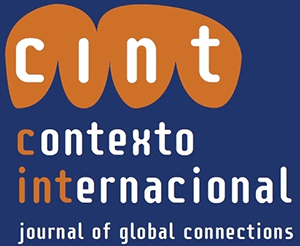Paulo Chamon, PhD Candidate and Adjunct professor at the Institute of International Relations of the Pontifical Catholic University of Rio de Janeiro (IRI/PUC-Rio), Rio de Janeiro, RJ, Brazil
 In the past two decades, critical thinking in the field of International Relations has turned to reflections on the temporalities of world politics. The special issue of Contexto Internacional titled “Decolonial Temporalities: plural pasts, irreducible presents, open futures” furthers these investigations by engaging questions of coloniality through the prism of time.
In the past two decades, critical thinking in the field of International Relations has turned to reflections on the temporalities of world politics. The special issue of Contexto Internacional titled “Decolonial Temporalities: plural pasts, irreducible presents, open futures” furthers these investigations by engaging questions of coloniality through the prism of time.
The contributions to this issue go beyond the demand for more attention to the plurality of temporalities constituting world politics. In different ways, they excavate, read, and cultivate those temporalities. In doing so, they offer conceptual innovation to the critique of historicism and new interpretations of existing relations between past, present, and future.
Conceptually, the special issue advances the reflection on the relationship between historicism and coloniality, and endeavors to go beyond the rewriting of history towards the conceptual groundwork necessary for imagining and building decolonial futures. In each case, the authors ground their conceptual investigation in concrete articulations of past, present, and future.
In this sense, three of the contributions further the important critique of historicism in Dipesh Chakrabarty’s Provincializing Europe. Hitomi Koyama’s “Historicism, coloniality, and culture in Wartime Japan” explores the ambiguity of historicism that remains absent in Chakrabarty. In doing so, she reveals the ‘blindness to plurality’ of discourses that oppose stages of development while surreptitiously reproducing coloniality. While she turns to the imperial discourse of early 20th century Japan, her argument speaks to our present of imperialism coated in the defense of particularities. Manu Samnotra’s project in “Provincialising Heidegger; globalising Arendt” envisions to take us beyond Chakrabarty’s (Heideggerian) politics of ‘fragmented times’. By working through Arendt’s concepts of plurality and natality, he develops a post-colonial politics sensible to the radical openness of new beginnings that could better realize the project of provincialization. Finally, Anna M. Agathangelou’s “Evasion of time: Of Eschaton and other illusions” directly opposes Chakrabarty’s play of mutually interrupting historical forms, locating decolonial possibilities in her reading of Fanon’s politics of struggle in time.
Also thinking through historicism, Aparne Devare’s “Exploring Past Myths through Giambattista Vico and Jyotuba Phule” turns to the onset of the historicization of myths to highlight the possibilities and limits of modern history. She then uncovers a concrete alternative for political imagination in Phule’s politics of rewriting myths.
The bulk of the special issue contemplates contributions to imagining alternative formations of past, present, and future that remains alongside Western linear history, thus cultivating possibilities both within and beyond the West.
Narendran Kumarakulasingan and Mvuseleto Ngcoya’s “Plant provocations: Botanical indigeneity and (de)colonial imaginations” discusses the limits and possibilities of ‘indigeneity’ in the context of settler colonialism, by engaging the growing South African white middle-class ‘indigenous gardening’ and rural black women ‘subsistence agriculture’. In doing so, they reveal the difficulties of ‘indigeneity’ in local and transnational movements, and cultivate ways of relating to land, plants, community, past, present, and future that unsettles colonial segregations in space, time, and knowledge. The colonial erasure of indigenous practices of sovereignty is also explored in João Urt’s “How western sovereignty occludes indigenous governance: The Guarani and Kaiowa peoples in Brazil”. The author cultivates the Guarani and Kaiowa peoples’ myths, showing how they sustain alternative practices of sovereignty. The system of states’ reliance on linear history is thus shown to occlude indigenous sovereignty to sustain itself. Ángela Iranzo Dosdad’s “From the secular to the Habermasian post-secular and the Forgotten dimension of time in rethinking religion and politics” highlights the erasure of different forms of life hidden in the claim that we live in a world open to religious diversity. By turning to time, she unveils how the assumptions of rationalism and legalism in post-secularity reproduce coloniality by foreclosing ways of relating to the sacred and, thus, to past, present, and future.
Finally, the articles by Shiera el-Malik and Khadija El Alaoui expand our political horizons by excavating alternative practices of relating to and imagining the future. El-Malik’s “Reading imaginative futures across historical moments; Or speaking surreptitiously in imperial centres” finds, in Senghor’s 1961 lecture at Oxford, both a specific form of engagement—surreptitiousness—and a discourse that taps into the unrealized futures of the past that remains in our present. Al Alaoui’s “The wisdom of stubborness” turns to poets, storytellers, her students’ solidarity towards unknown oppressed cousins, and her own voice to narrate her encounter with politics as “your memories that you fear to gaze at but you gaze at them despite it all” (al-Barghouti, 2011 in Al Alaoui, 2016, p. 826). Bending both academic form and political time, she invites sensibility to colonial wounds and resistances.
The result of this thorough exploration of the temporalities of world politics is the conviction that there is much to be gained not only in highlighting the importance of time to the field of International Relations, but also in the concrete cultivation of the multiple temporalities that continue to exist both within and beyond the colonial legacy of Western linear time. Through such engagement, the contributions to this special issue significantly clarify the conceptual apparatus available for thinking through (de)colonial temporalities, and instigate our imagination and possibilities towards ‘plural pasts, irreducible presents, and open futures’. These articles will be of great interest to all those interested in coloniality, temporality, and the ambiguous relationship between modern history and politics.
References
Contexto int. vol.38 no.3 Rio de Janeiro set./dez. 2016
External Link
Contexto Internacional – CINT – www.scielo.br/cint
Como citar este post [ISO 690/2010]:


















Recent Comments